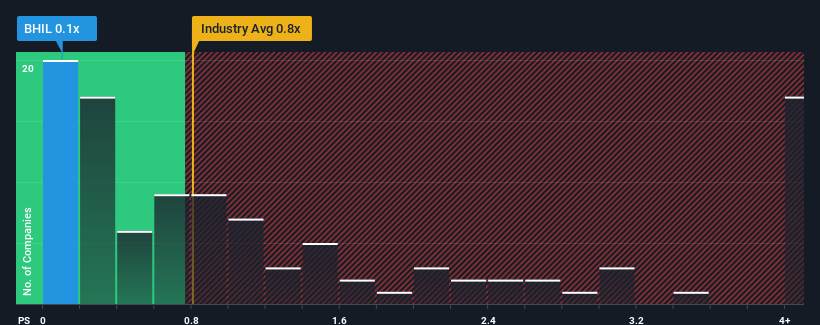- United States
- /
- Food
- /
- OTCPK:BHIL.Q
Benson Hill, Inc. (NYSE:BHIL) Shares Fly 38% But Investors Aren't Buying For Growth

Benson Hill, Inc. (NYSE:BHIL) shareholders are no doubt pleased to see that the share price has bounced 38% in the last month, although it is still struggling to make up recently lost ground. But the last month did very little to improve the 93% share price decline over the last year.
Even after such a large jump in price, considering around half the companies operating in the United States' Food industry have price-to-sales ratios (or "P/S") above 0.8x, you may still consider Benson Hill as an solid investment opportunity with its 0.1x P/S ratio. However, the P/S might be low for a reason and it requires further investigation to determine if it's justified.
View our latest analysis for Benson Hill

How Has Benson Hill Performed Recently?
With revenue growth that's superior to most other companies of late, Benson Hill has been doing relatively well. It might be that many expect the strong revenue performance to degrade substantially, which has repressed the share price, and thus the P/S ratio. If the company manages to stay the course, then investors should be rewarded with a share price that matches its revenue figures.
Keen to find out how analysts think Benson Hill's future stacks up against the industry? In that case, our free report is a great place to start.What Are Revenue Growth Metrics Telling Us About The Low P/S?
In order to justify its P/S ratio, Benson Hill would need to produce sluggish growth that's trailing the industry.
If we review the last year of revenue growth, the company posted a terrific increase of 69%. This great performance means it was also able to deliver immense revenue growth over the last three years. So we can start by confirming that the company has done a tremendous job of growing revenue over that time.
Looking ahead now, revenue is anticipated to slump, contracting by 30% per annum during the coming three years according to the dual analysts following the company. That's not great when the rest of the industry is expected to grow by 2.8% each year.
With this in consideration, we find it intriguing that Benson Hill's P/S is closely matching its industry peers. Nonetheless, there's no guarantee the P/S has reached a floor yet with revenue going in reverse. There's potential for the P/S to fall to even lower levels if the company doesn't improve its top-line growth.
What Does Benson Hill's P/S Mean For Investors?
The latest share price surge wasn't enough to lift Benson Hill's P/S close to the industry median. Generally, our preference is to limit the use of the price-to-sales ratio to establishing what the market thinks about the overall health of a company.
As we suspected, our examination of Benson Hill's analyst forecasts revealed that its outlook for shrinking revenue is contributing to its low P/S. At this stage investors feel the potential for an improvement in revenue isn't great enough to justify a higher P/S ratio. It's hard to see the share price rising strongly in the near future under these circumstances.
You need to take note of risks, for example - Benson Hill has 4 warning signs (and 1 which shouldn't be ignored) we think you should know about.
Of course, profitable companies with a history of great earnings growth are generally safer bets. So you may wish to see this free collection of other companies that have reasonable P/E ratios and have grown earnings strongly.
Valuation is complex, but we're here to simplify it.
Discover if Benson Hill might be undervalued or overvalued with our detailed analysis, featuring fair value estimates, potential risks, dividends, insider trades, and its financial condition.
Access Free AnalysisHave feedback on this article? Concerned about the content? Get in touch with us directly. Alternatively, email editorial-team (at) simplywallst.com.
This article by Simply Wall St is general in nature. We provide commentary based on historical data and analyst forecasts only using an unbiased methodology and our articles are not intended to be financial advice. It does not constitute a recommendation to buy or sell any stock, and does not take account of your objectives, or your financial situation. We aim to bring you long-term focused analysis driven by fundamental data. Note that our analysis may not factor in the latest price-sensitive company announcements or qualitative material. Simply Wall St has no position in any stocks mentioned.
About OTCPK:BHIL.Q
Benson Hill
Operates as a food technology company that unlocks natural genetic diversity of plants.
Slight and slightly overvalued.
Similar Companies
Market Insights
Community Narratives




